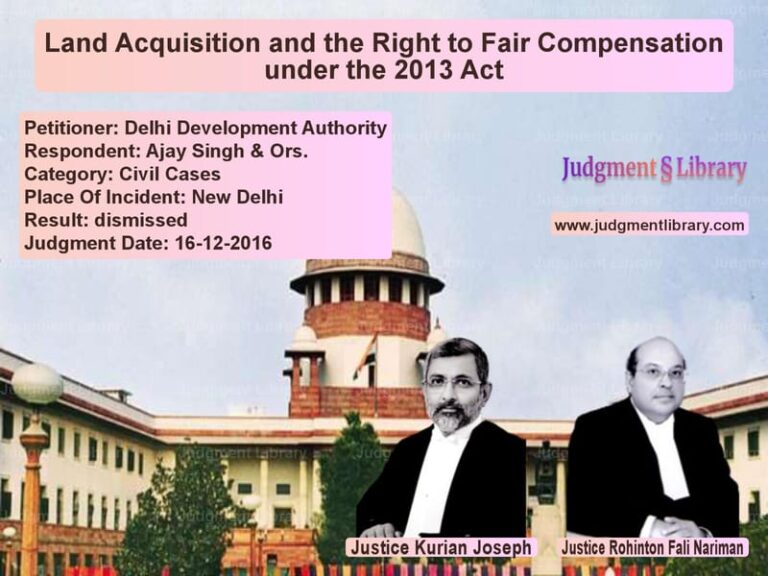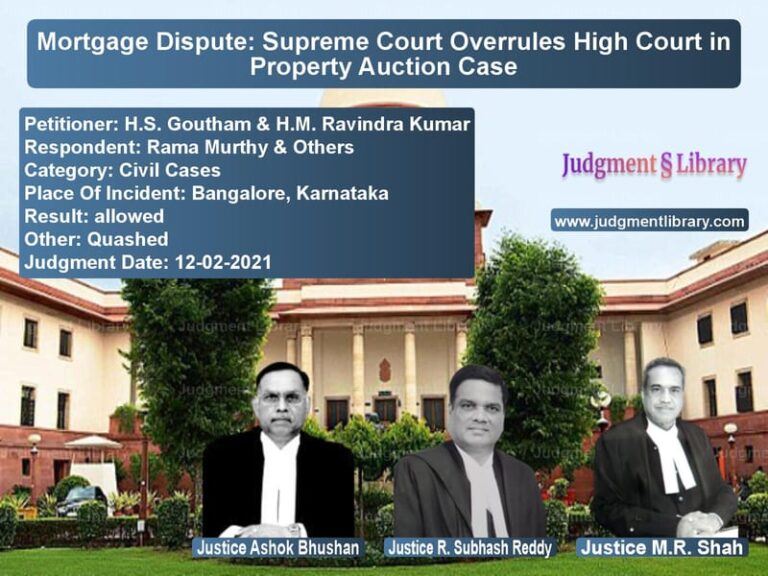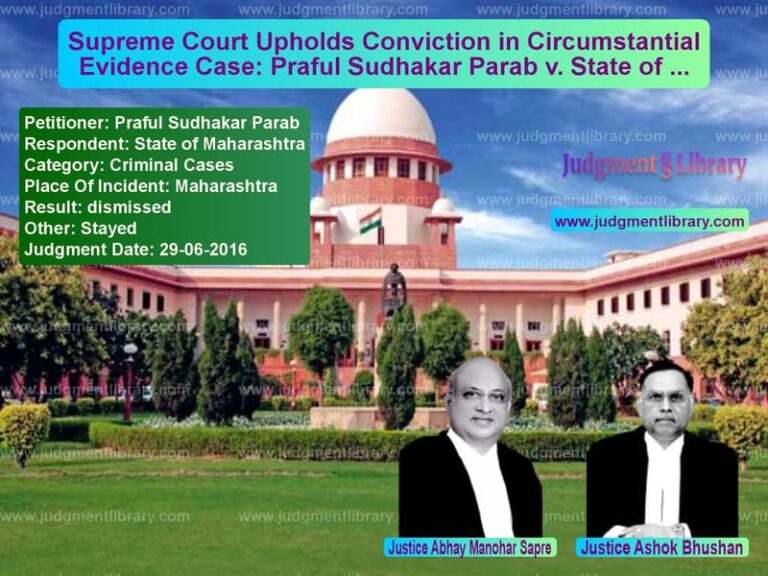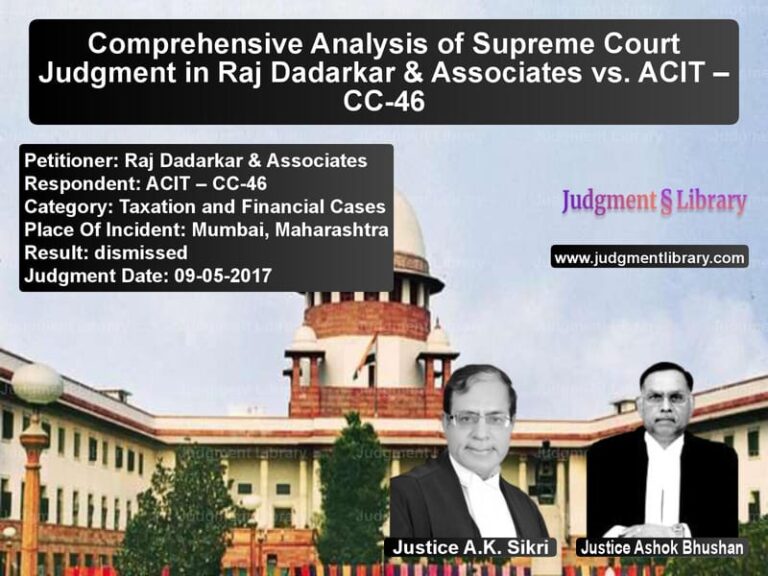Supreme Court Upholds Validity of Parents’ Wills Amidst Probate Dispute
The case in question revolves around the dispute over the probate of two Wills executed by a couple, Mannar Reddiar and Adhilakshmiammal. The legal battle was waged between their children—sons V.M. Chandrasekaran and V.M. Sivakumar, and daughter Kalavathy. While the sons were the beneficiaries under the Wills, the daughter was excluded, leading to a challenge before the courts. After being contested in multiple forums, the matter reached the Supreme Court, which upheld the validity of the Wills, reversing the decision of the High Court.
The dispute primarily arose due to allegations of suspicious circumstances surrounding the execution of the Wills. The daughter, Kalavathy, and her brother V.M. Sivakumar, who was initially a beneficiary, challenged the authenticity of the Wills, arguing that the circumstances under which they were made cast serious doubts over their legitimacy.
Background of the Case
Mannar Reddiar and Adhilakshmiammal had three children—two sons and a daughter. The mother, Adhilakshmiammal, passed away on August 14, 1995. Before her demise, she executed a Will on January 30, 1995, bequeathing her properties to her two sons, excluding her daughter. Her reasoning, as recorded in the Will, was that Kalavathy had already been provided for during her lifetime.
Five years later, the father, Mannar Reddiar, passed away on August 8, 2000. He had also executed a Will on December 10, 1998, in which he bequeathed his properties to his sons and grandchildren, once again excluding the daughter. This exclusion of the daughter formed the crux of the dispute.
Proceedings Before the Probate Court
After learning about the partition suit filed by Kalavathy and V.M. Sivakumar in the District Munsiff Court, Poonamallee, the appellants—wife and sons of the deceased eldest son V.M. Chandrasekaran—filed a probate petition. They sought the grant of probate for the Wills of both parents before the Principal District Judge, Vellore. The probate petition was filed under Sections 270, 276, and 289 of the Indian Succession Act, 1925.
The respondents, Kalavathy and V.M. Sivakumar, fiercely contested the probate petition, claiming that their parents had never executed such Wills. They argued that their deceased brother, V.M. Chandrasekaran, had fabricated the Wills by obtaining their mother’s signatures on blank papers. Furthermore, they contended that their parents had no right to bequeath the properties in such a manner.
High Court’s Decision
The High Court, while ruling in favor of the respondents, cited multiple suspicious circumstances that cast doubt on the validity of the Wills:
- The failure to provide medical details of the mother, who was allegedly suffering from ailments before executing the Will.
- The delay in seeking probate of the mother’s Will after her passing.
- Contradictions in the testimonies of witnesses regarding the timing of the execution and registration of the father’s Will.
- The exclusion of the daughter from inheritance, despite no mention of specific amounts received by her.
- The presence of the primary beneficiary at the time of execution of both Wills, raising concerns about undue influence.
Supreme Court’s Judgment
The Supreme Court overturned the High Court’s ruling and restored the decision of the Probate Court. The key findings of the Supreme Court were:
“The exclusion of one of the natural heirs from the bequest cannot by itself be a ground to hold that there are suspicious circumstances. The reasons given in Exhibit P-1 are more than convincing to show that the exclusion of the daughter has happened in a very natural way.”
The Court ruled that the High Court had misread the circumstances and placed undue weight on minor contradictions. It also clarified that:
“The law relating to suspicious circumstances surrounding the execution of a Will is already well-settled and it needs no reiteration.”
The judgment emphasized that unless there is a substantial doubt regarding the mental capacity of the testator or proof of undue influence, the validity of a Will should not be questioned based solely on subjective suspicions.
Legal Precedents Cited
The Supreme Court referred to past rulings, particularly the case of Kavita Kanwar vs. Mrs. Pamela Mehta and H. Venkatachala Iyengar vs. B.N. Thimmajamma, which have established principles regarding the evaluation of suspicious circumstances surrounding Wills.
Conclusion
The Supreme Court’s ruling reaffirmed the validity of testamentary freedom in India. The judgment clarified that mere exclusion of an heir does not, in itself, create suspicion. The decision ensures that the wishes of testators, when legally executed, must be upheld unless compelling evidence of fraud or coercion is provided. The probate granted by the District Court was restored, thereby reinforcing the principle that testamentary freedom must be respected.
Petitioner Name: Swarnalatha & Ors..Respondent Name: Kalavathy & Ors..Judgment By: Justice V. Ramasubramanian, Justice Hemant Gupta.Place Of Incident: Poonamallee, Tamil Nadu.Judgment Date: 30-03-2022.
Don’t miss out on the full details! Download the complete judgment in PDF format below and gain valuable insights instantly!
Download Judgment: swarnalatha-&-ors.-vs-kalavathy-&-ors.-supreme-court-of-india-judgment-dated-30-03-2022.pdf
Directly Download Judgment: Directly download this Judgment
See all petitions in Succession and Wills
See all petitions in Property Disputes
See all petitions in Judgment by V. Ramasubramanian
See all petitions in Judgment by Hemant Gupta
See all petitions in allowed
See all petitions in supreme court of India judgments March 2022
See all petitions in 2022 judgments
See all posts in Civil Cases Category
See all allowed petitions in Civil Cases Category
See all Dismissed petitions in Civil Cases Category
See all partially allowed petitions in Civil Cases Category







